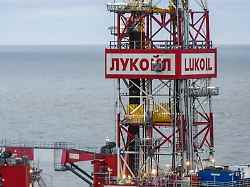Response to oil price cap
Russia builds “shadow fleet” from old tankers
12/03/2022, 9:28 p.m
From Monday, the G7, the EU and Australia want to pay a maximum of 60 dollars per barrel of Russian oil transported by ship. This is to be enforced by putting pressure on insurers, for example. However, according to a report, Russia has reacted – and is buying old tankers.
According to a media report, Russia has secretly assembled a fleet of more than 100 old tankers to circumvent Western sanctions on oil exports. That reports the “Financial Times” citing shipbroker Braemar and oil and gas industry analysis firm Rystad Energy.
According to Braemar, Moscow has directly or indirectly bought more than 100 ships. Rystad Energy reports that 103 tankers were purchased or relocated from Iran or Venezuela – both countries, like Russia, are subject to Western sanctions.
According to the Financial Times, oil shipping circles are talking about a “shadow fleet” that could be used to supply China and India, among others, after the start of the Western oil price cap, which are buying more Russian oil due to declining imports to Western countries. The tankers are between 12 and 15 years old and would otherwise probably be scrapped in the next few years.
Moscow wants to react
The EU, the G7 countries and Australia on Friday agreed on a price cap of 60 dollars (57 euros) for Russian oil imports if the raw material is transported by ship as punishment for the Russian attack on Ukraine in February. The regulation should take effect from Monday. Moscow has sharply criticized the agreement and promised a reaction, but without being specific. It is possible, for example, that Moscow will stop supplying oil to the countries involved.
The measure is intended to restrict Moscow’s means of financing the war against Ukraine. The upper price limit is to be enforced by the fact that insurance companies and shipping companies are only allowed to participate in Russian oil deals if the raw material is sold for less than 60 dollars.
Since large companies are likely to comply with the regulation for fear of Western punitive measures, Russia, which depends on foreign tankers to transport its oil, has to switch to other means of transport. The “Financial Times” quotes traders as saying that the “shadow fleet” can mitigate the consequences of the western oil price cap, but not completely eliminate them.
